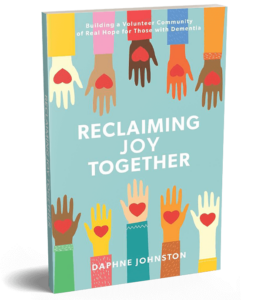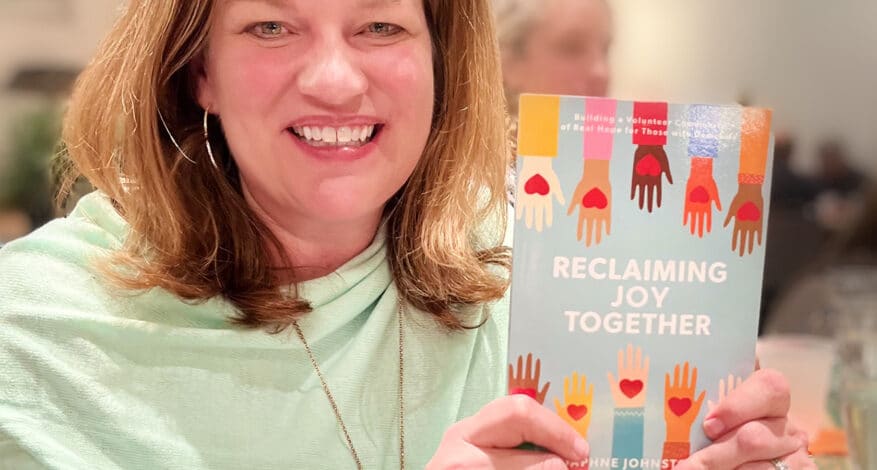New Book Offers Hope by Highlighting Innovative Dementia Care Program
Montgomery, AL – Alzheimer’s disease and related dementias are a global health crisis, one expected to only get worse in the coming decades; the World Health Organization estimates the number of people living with dementia by 2050 will hit 150 million.
 That’s daunting news. But there is great hope. It comes in the form of friendship revolutions happening in communities across the country, where local volunteers are learning how to support families and loved ones living with dementia using programs called Respite ministries. How Respite care operates is outlined in a thought-provoking new book, “Reclaiming Joy Together,” by Daphne Johnston, executive director and co-founder of the Respite for All Foundation (RFA). Johnston, who launched and led the Respite Ministry at First United Methodist Church in Montgomery, Ala., for ten years, co-founded RFA in 2018 to help other churches and organizations replicate the successful program.
That’s daunting news. But there is great hope. It comes in the form of friendship revolutions happening in communities across the country, where local volunteers are learning how to support families and loved ones living with dementia using programs called Respite ministries. How Respite care operates is outlined in a thought-provoking new book, “Reclaiming Joy Together,” by Daphne Johnston, executive director and co-founder of the Respite for All Foundation (RFA). Johnston, who launched and led the Respite Ministry at First United Methodist Church in Montgomery, Ala., for ten years, co-founded RFA in 2018 to help other churches and organizations replicate the successful program.
In stark contrast to disease-centered dementia care, which views dementia patients as a problem to be managed, faith-based Respite ministries offer person-centered care, care that’s based on the formation of relationships and community.
Using an innovative volunteer-based model, Respite serves both the care partner and the loved one they are caring for, and the lessons offered in “Reclaiming Joy Together” offer insight on how to reshape the mindset of a care partner so that both persons might have better quality of life.
For Johnston, the volunteers who make up the majority of Respite’s staff are the forerunners in dementia care and the forces that drive the friendship revolutions at the heart of the Respite model. “In the Respite care environment, everyone is a volunteer. Everyone is needy because he or she needs to either receive help or give help,” Johnston says. Plus, relying so heavily on volunteers allows Respite communities to truly thrive in any locale. “The use of local volunteers makes Respite an adaptable model that can be tailored to any community and fit its specific needs, resources and gifts,” she says.
The original Respite Ministry at FUMC, along with the two dozen other Respite ministries that Johnston trained and mentored, have proven that Respite programs work; evidence can be seen in the smiling faces of volunteers, participants and their care partners. But the medical community has taken notice and offered praise too. Dr. Allen Power, a board-certified internist and geriatrician and Clinical Associate Professor of Medicine at the University of Rochester, New York and an international educator on transformational models of care for older adults, has this to say about Respite: “I am so pleased to see the success of the Respite Ministries,” he says.
“This volunteer-run model leverages social capital to provide an engaging, meaningful and affordable way of helping people in our communities to live well with dementia. The benefits of the model are reciprocal, enhancing the well-being of all who participate.”
In “Reclaiming Joy Together,” Johnston draws on her day-to-day experiences leading FUMC’s Respite Ministry for 10 years to share details of the ministry’s inspiring work with moving stories that show the true friendships formed between Respite’s participants, their care partners and the program’s volunteers.
But the book isn’t just a retelling of moments from the local Respite program; Johnston also gives a multitude of practical wisdom and the basic information needed for others to begin Respite ministries in their communities, effectively making the book a blueprint that will encourage Respite startups anywhere and everywhere.
There’s no doubt Johnston knows how to spread the Respite philosophy she’s honed in Montgomery and through her experiences training new directors and hundreds of volunteers for the 28 Respite communities currently in the RFA network. Now, thanks to “Reclaiming Joy Together,” Respite’s transformational model of care is accessible to communities across the globe.

